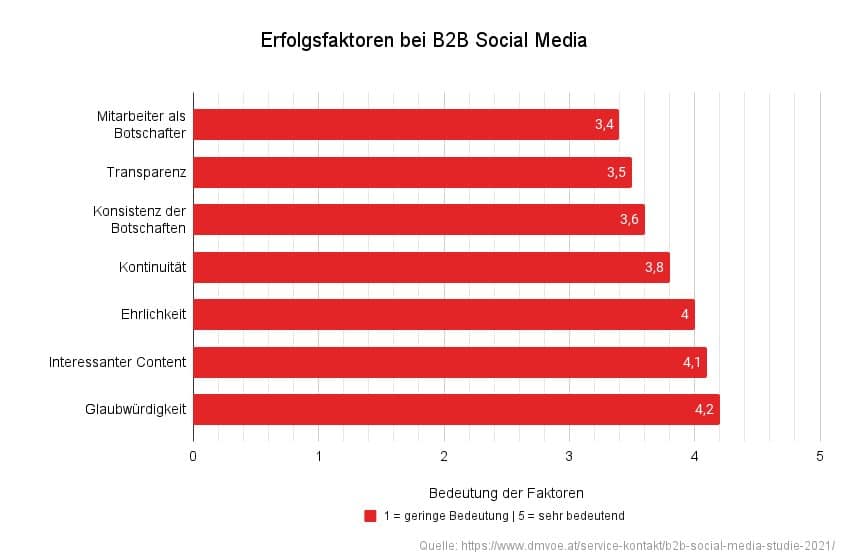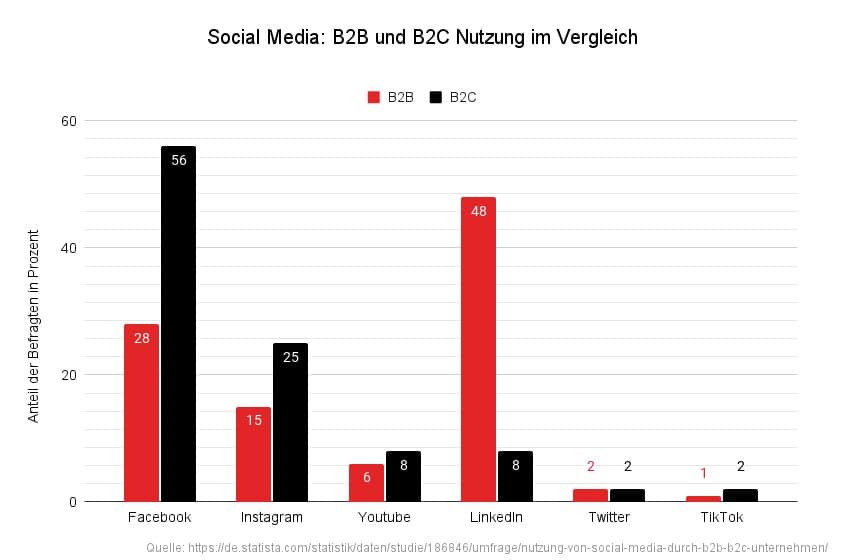Social media has evolved far beyond the scope of a simple marketing platform and offers a multitude of possibilities in the B2B context that are much more than pure product marketing. It has become an indispensable tool for B2B communication and business development.
The multiple roles of social media in B2B
While social media was initially used as a tool to increase brand awareness and customer loyalty, today these platforms serve a variety of purposes for companies: from customer service and recruitment to market research and direct business development.
Social media also offers B2B companies the opportunity to build deep and lasting relationships with their customers and gain valuable feedback and insights. At the same time, each social network has specific characteristics and its own audience, which should be taken into account in strategic planning.
In Austria, a whopping 98.8 % of B2B companies used social media in 2021. Almost two-thirds of the companies not only use organic reach, but also paid postings. Below you will find the different success factors for social media with their weighting among B2B marketers in German-speaking countries.

B2B Social Media: The importance of target group analysis
One of the keys to effective B2B Social Media Marketing is understanding your target groups. Demographic data and B2B personas are the basis. With this, you identify which social media your target groups use and how they use them.
In addition, the data collected on social media platforms provides valuable insight into the preferences and behaviour of your target groups. With this knowledge, you can refine your communication and offers accordingly.
Note that different professional groups may have different behaviours. IT and marketing managers usually also use social media for professional purposes and thus fall into different target group segments.
The role of LinkedIn, Facebook and Instagram in B2B communication
LinkedIn has established itself as the preferred platform for B2B communication on social media, despite the dominance of Facebook and Instagram in B2C. According to a Study by Social Media Examiner from the year 2023, 48 % of the B2B companies preferred LinkedIn for their marketing activities.
LinkedIn offers B2B companies the opportunity to address decision-makers and professionals in a collective manner. Important interactions on LinkedIn include:
- Networking with business partners
- Placing job ads & recruiting
- Create and maintain company pages
- Sharing and commenting on professional content
- Lead generation through downloads or direct interaction
- Establishing expert status
With the right content strategy focused on thought leadership, brand authenticity and tailored messaging, companies can thus build a stronger brand presence on LinkedIn.

In German-speaking countries, social media is often divided into professional and private networks. Facebook and Instagram are often considered to be mainly privately used platforms. Nevertheless, B2B target groups can also be identified well here and addressed in a targeted manner. It makes sense to supplement marketing activities here with paid advertising, as the organic reach is limited. Furthermore, advertising on Facebook is often cheaper than on LinkedIn and the advertising pressure on the B2B target groups is less high.
"" Did you like this article? Then stay up to date with our newsletter! ""
The role of content marketing in B2B social media channels
Content marketing has proven to be Effective lead generation and branding strategy established in B2B social media channels. By sharing blogs, eBooks, webinars and other content, companies can capture the attention of their B2B target audience on social media and guide them through the sales funnel accordingly.
Consistent and regular content publication can help to gain the trust of the target group and at the same time raise the profile of the Brand increase. In addition, it is crucial that your content is regularly updated and responds to current events or trends in your industry to increase the relevance and engagement of your target audience.
The importance of social selling in the B2B sector
With social selling, content is shared on social media not about a company, but about a person. For this purpose you can Train brand ambassadors or B2B influencerswho act as opinion leaders, knowledge brokers and mouthpieces to disseminate the company's content for a specific topic area. This increases the authenticity of your posts and improves lead generation.
In addition, promote the active Participation of your employees in the social media presence of your company. Their personal networks and influence can help increase the reach and credibility of your messages. At the same time, they can initiate a deeper dialogue with the community and positively represent the company culture.
In this case, it would be worth considering the Implementation of a Corporate Influencer Programme. This requires clear guidelines, training for employees, support from management and recognition and appreciation of B2B social media contributions by corporate influencers, for example through incentives.
The role of social media in employer branding

By sharing emotional topics and success stories, you can reach potential applicants and leave a positive impression of your company. This social recruiting is particularly effective with younger target groups who are often active on social platforms.
The need for a clearly defined B2B social media strategy
The days when companies considered social media a free marketing channel are over. Today Clear goals for your B2B social media activities indispensable, whether
- to increase brand awareness,
- to strengthen brand loyalty or
- for lead generation.
Planning and implementing your B2B social media strategy is time-consuming, especially if you have to evaluate, adapt or create new content. This costs time and resources.
With appropriate metrics and analytics tools, you end up monitoring and measuring the success of your social media activities. Monitor clicks, interactions and leads. Respond to feedback and continuously optimise strategy and measures.
"" Did you like this article? Then stay up to date with our newsletter! ""
Key strategies for success in B2B social media
In order to ensure a successful presence on these platforms, B2B companies should consider the following Key strategies take into account:
- Platform diversification: Choose the appropriate platforms based on your company's specific target groups, products and services.
- Content strategy: Develop high-quality, relevant and engaging content that meets the needs and expectations of your target audience.
- Analytics and data-driven marketingg: Use modern analytics tools and AI solutions to collect precise data about your customers and make your social media strategies more effective.
- Sustainability and social commitment: Include social and environmental issues in your social media presence to build customer trust and improve your brand perception.
- Use of AI and automation: Use artificial intelligence and automation to reduce the time spent on social media management while ensuring personalised communication.
- Data protection and security: Communicate transparently about how you protect and use customer data to build customer trust and loyalty.
Time and resource management for B2B communication in social media

Successful social media marketing requires significant resources. It is not just about posting content, but also about monitoring, community interaction and relationship management. These factors vary depending on the use of social networks and the activity of your target group. Consider whether there is sufficient expertise regarding the chosen platforms and also whether it makes sense to outsource certain tasks. And be sure to weigh up the cost-benefit ratio for each platform.
It is also important to remember that B2B social media should not be seen as an isolated activity, but as part of a company's overall marketing and communications mix that needs to be integrated into the overall strategy.
Conclusion on social media for companies in B2B
B2B social media has proven to be Effective method to increase visibility, improve brand identity and generate leads proven. With the right strategy and the appropriate B2B social media channels, companies can achieve a real competitive advantage.
It is crucial to respond to the constantly changing trends in the B2B communication in the area of social media and to use the platforms that are best suited to achieve the business objectives.
For more tips and insights into the world of the B2B marketing feel free to follow us on LinkedIn or subscribe to our Newsletter.







